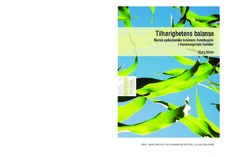| dc.contributor.author | Moen, Bjørg | |
| dc.date.accessioned | 2020-06-07T21:05:33Z | |
| dc.date.accessioned | 2021-04-29T13:49:18Z | |
| dc.date.available | 2020-06-07T21:05:33Z | |
| dc.date.available | 2021-04-29T13:49:18Z | |
| dc.date.issued | 2009 | |
| dc.identifier.isbn | 978-82-7894-328-1 | |
| dc.identifier.issn | 0808-5013 | |
| dc.identifier.uri | https://hdl.handle.net/20.500.12199/3304 | |
| dc.description.abstract | The report focuses on women’s daily life in Norwegian-Pakistani families. I dissolve the dichotomization between ”modern” and ”traditional” muslim women, which is frequently understood as ”westernized independent women” and ”muslim passive and oppressed women”. The diversity of adaptations and opionions among the women is emphasized in the report. Change and variation characterizes their lives, and family traditions and established structures of authority are challenged. The women participate in various arenas in the society, but continue to belong to dense Norwegian-Pakistani families and social networks. The family solidarity is strong also transnationally. The report deals with particularly three catogories of women: Daughters-in-laws from Pakistan, daughters grown up in Norway and mothers-in-laws/mothers from Pakistan. Of particular importance is the relation between daughters-in-law and mothers-in-law in Norwegian-Pakistani families. The three categories of women have different oppportunities to participate in the Norwegian society. Wives of the first Pakistani migrants who emigrated to Norway came to a foreign place, while women who move to Norway today arrive in a home and a community with ”Pakistani” services, shops and networks. The families have transnational adaptations both mentally, culturally, religiously and geographically. Economic and social obligations extend national borders to family members in Pakistan. I call this a migration contract. Family members are expected to give something in return for the economic rewards that emigration has given them. Economic and social obligations between generations are stressed in Norwegian-Pakistani families. The generation contract includes responsibility for elderly parents/parents-in-law in Norway and Pakistan. Gifts, services, and marriages with women and men from Pakistan contribute to comply with these contracts and sense of belonging to home places in Pakistan. | en |
| dc.description.abstract | Rapporten setter søkelys på kvinners hverdagsliv i norsk-pakistanske familier. Forskeren har søkt å løse opp dikotomiseringen mellom «moderne» og «tradisjonelle» muslimske kvinner som ofte blir forstått i relasjon til «vestlige selvstendige kvinner» og «muslimske passive og undertrykte kvinner». Hun viser et mangfold av tilpasninger og meninger som kvinner har. Endringer og variasjoner preger livet, der familierelasjoner er i endring og tradisjonelle autoritetsstrukturer utfordres. Kvinner deltar på ulike arenaer i samfunnet, men fortsetter å ha tilhørighet i tette norsk-pakistanske familier og nettverk. Familiesamhold veier tungt også transnasjonalt. | no_NB |
| dc.publisher | Oslo Metropolitan University - OsloMet: NOVA | |
| dc.relation.ispartofseries | NOVA Rapport 13/09 | |
| dc.subject | NOVA | |
| dc.title | Tilhørighetens balanse | no_NB |
| dc.type | Report | |
| fagarkivet.source.pagenumber | 279 | |
